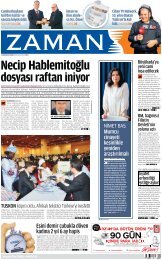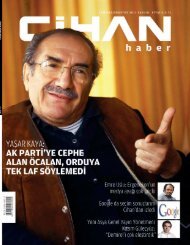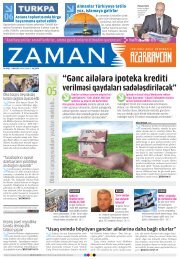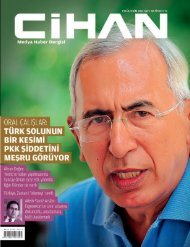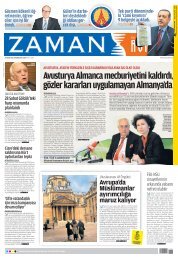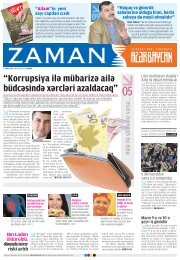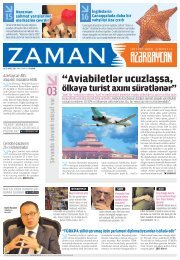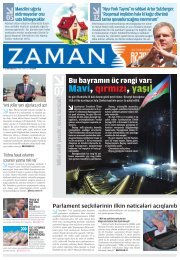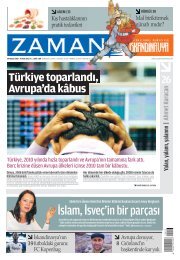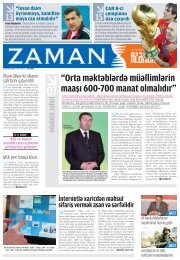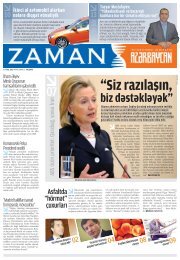Turkey warmly welcomes Russians - Today's Zaman
Turkey warmly welcomes Russians - Today's Zaman
Turkey warmly welcomes Russians - Today's Zaman
- No tags were found...
You also want an ePaper? Increase the reach of your titles
YUMPU automatically turns print PDFs into web optimized ePapers that Google loves.
R12-19-03-08.qxd 16.03.2008 21:39 Page 112 TODAY’S TOURISMMARCH 19-22, 2008SECTORTourýsm supportýng stronger economyÝLHAN BASMACI ÝSTANBULTurkish Federation of Hotel Enterprises(TÜROFED) Chairman Ahmet Barut hassaid the tourism sector has become a giantindustry with a total contribution to the economy of$20 billion, but added that tourism revenues havedeclined in 2007, despite an increase in the numberof tourists, due to an overvalued Turkish lira.Barut underlined that hotel occupancy rates inthe July-August term in 2007 were very high but theovervalued Turkish lira and a low foreign currencyrate had negatively affected the tourism sector. “Ourrevenue has declined despite the increased numberof tourists. … Our profits have declined incomparison to last year,” he said.Noting that domestic tourism plays thegreatest role in the overall success of a country’stourism industry, Barut also recalled that a revivalin domestic tourism is relevant to the economicprogress of the country. “Per capita income in<strong>Turkey</strong> is about $5,000-$6,000. When this rises to$10,000, domestic tourism will revive. The shareof domestic tourism at resorts is 10 percent atpresent; it is 30 percent in Ýstanbul and 50percent in city hotels. As long as the economicsituation of the country continues to improve, theidea of going on vacation will also develop andspread. This will trigger domestic tourism. Today,a family trying to survive under minimum wagecannot go on vacation in Kuþadasý. People willtend to spend money for vacations only if theysecure their future. Domestic tourism has revivedmore recently; private airlines contributed tothis. I think domestic tourism will developfurther and in parallel with increased welfarelevels,” Barut explained.Despite some difficulties it is possible toextend sea and sun tourism throughout the year,Barut noted, adding: “Our country sees an influxof 22 million tourists [annually]. This issomething very significant. People would notcome if they thought they would be unable tofind what they expected. We need to convincethem that <strong>Turkey</strong> is spectacular in the winter aswell. For this reason, additional facilities like golfresorts and [sports] fields, convention centers andthermal spas should be built in regions known fortheir attractive sun and seashores. MostEuropeans are not aware that skiing is possiblein <strong>Turkey</strong> during the winter. We need work moreto effectively promote these possibilities. Wehave so far failed to explain the quality of resorthotels and spa centers to visitors. We must paymore attention to the promotion of wintertourism and make all necessary arrangements.”PHOTO CÝHANMurat Dedeman<strong>Turkey</strong> expectsmore tourists despiteEurope’s woes<strong>Turkey</strong> expects a strong tourist seasonin 2008 despite an economic slowdownin Europe, its main market, and securityconcerns linked to separatist terrorists,tourism officials said on Monday.The tourism sector is a key source offoreign currency earnings for <strong>Turkey</strong>, aEuropean Union candidate country, and helpsto temper its bulging current account deficit.The Turkish Tourism Investors Association(TYD) expects the number of foreign touristsvisiting <strong>Turkey</strong> to rise 12 percent in 2008,resulting in revenues of up to $21 billion, saidMurat Dedeman, the association’s head.“It seems the trend is very good and that<strong>Turkey</strong> will have a good season. People aretalking about a recession but this does not havetoo much effect on tourism,” he told Reuters.A credit crunch originating in the UShousing market is starting to affecteconomies around the world. TheInternational Monetary Fund has cut itsforecast of 2008 economic growth in theeuro zone, home of many visitors to <strong>Turkey</strong>,by 0.5 percentage point to 1.6 percent andsays the global economy may deliver itsweakest performance in five years this year.Dedeman’s optimism was echoed by theTurkish Association of Travel Agents(TÜRSAB), which predicts a 15 percent increasein tourist numbers in 2008 to 27 million.“Our contacts in market countries and theinformation gathered show that <strong>Turkey</strong>reservations remained in a positive direction asof March,” TÜRSAB Chairman Baþaran Ulusoysaid, without giving any figures. Reservations,including from Germany, the biggest source oftourists to <strong>Turkey</strong>, are rising, he added.Holidays a ‘necessity’Dedeman said holidaying abroad hadbecome an established habit amongEuropeans, however tough the economicenvironment.“Tourism is the sector which will beaffected last by a recession. Holidays havebecome a necessity for people. If they spentfour days on holiday in the past, then theytrim this to three days but they will still takeholidays,” he said. Increased flights, newgolf courses and thriving convention centersare helping to lure more foreign travelers.The number of tourists visiting <strong>Turkey</strong> inJanuary alone rose 9.6 percent year-on-year.<strong>Turkey</strong>’s recent large-scale armyoffensive into northern Iraq against theoutlawed Kurdistan Workers’ Party (PKK)has had no discernible effect on reservations,both Dedeman and Ulusoy said.The Turkish military withdrew its troopsfrom Iraq last week saying it had achievedits objectives. Groups linked to the PKKhave attacked targets in coastal resorts,although generally the violence has beenlimited to mainly Kurdish southeast <strong>Turkey</strong>,many hundreds of kilometers from the maintourist centers. <strong>Turkey</strong> had a bumpertourism year in 2007, with the number oftourists rising 18 percent year-on-year, andtotal spending reached $18.5 billion. Thiscompares with total global growth in thetourism sector in 2007 of 6.5 percent.The government should provideincentives to boost tourism in relativelyundeveloped eastern parts of <strong>Turkey</strong>’sMediterranean coast, far from traditionalspots such as Antalya, Dedeman said.If this were done, <strong>Turkey</strong> could boost itsannual tourist numbers to 40 million andrevenues to $40 billion by 2013, he added.<strong>Turkey</strong> has the longest coast in theMediterranean. “We could attract tourists fromIran, Iraq and Syria to that part of the coastbecause it is near to them,” Dedeman said.




